

Board Observers Weekly - July 1st, 2014. What's next for GoPro? Last Thursday was the first day of trading of GoPro.
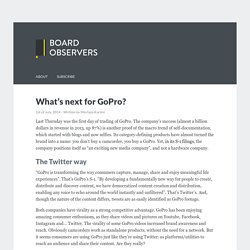
The company’s success (almost a billion dollars in revenue in 2013, up 87%) is another proof of the macro trend of self-documentation, which started with blogs and now selfies. Its category-defining products have almost turned the brand into a name: you don’t buy a camcorder, you buy a GoPro. Valuations. People have been saying that startup valuations are really high for about 3 years now.
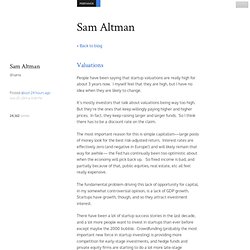
I myself feel that they are high, but I have no idea when they are likely to change. It’s mostly investors that talk about valuations being way too high. But they’re the ones that keep willingly paying higher and higher prices. In fact, they keep raising larger and larger funds. So I think there has to be a discount rate on the claim. The most important reason for this is simple capitalism—large pools of money look for the best risk-adjusted return. The fundamental problem driving this lack of opportunity for capital, in my somewhat controversial opinion, is a lack of GDP growth. There have been a lot of startup success stories in the last decade, and a lot more people want to invest in startups than ever before except maybe the 2000 bubble.
A lot of these new investors are willing to accept lower returns than VC firms, given the alternative options for investing the capital. A Dozen Things I’ve Learned from Reid Hoffman. Good Listeners. “Entrepreneurs are often given two pieces of contradictory advice: persistence and flexibility.
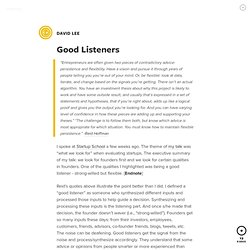
Have a vision and pursue it through years of people telling you you’re out of your mind. Or, be flexible: look at data, iterate, and change based on the signals you’re getting. There isn’t an actual algorithm. You have an investment thesis about why this project is likely to work and have some outside result, and usually that’s expressed in a set of statements and hypotheses, that if you’re right about, adds up like a logical proof and gives you the output you’re looking for.
And you can have varying level of confidence in how these pieces are adding up and supporting your theses.” I spoke at Startup School a few weeks ago. Reid’s quotes above illustrate the point better than I did. [Endnote] The example I used in my talk was Rick Morrison from Comprehend Systems. Kudos. Understanding Customer Acquisition Costs — Growth Hacking, Marketing and Venture Capital. The Two Key Skill Sets Startups Must Develop To Grow. In "Why Winning Streaks End", Rosabeth Kantar, a professor at HBS, explains the key to maintaining momentum in any company is maintaining the discipline of every day processes.
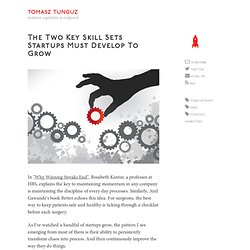
Similarly, Atul Gawande's book Better echoes this idea. For surgeons, the best way to keep patients safe and healthy is ticking through a checklist before each surgery. As I've watched a handful of startups grow, the pattern I see emerging from most of them is their ability to persistently transform chaos into process. And then continuously improve the way they do things. At the beginning, each of these companies pursued product development with something akin to Lean Startup Method. The ideal startup career path. For most people I know who join or start companies, the primary goal is not to get rich – it is to work on something they love, with people they respect, and to not be beholden to the vagaries of the market- in other words, to be independent.
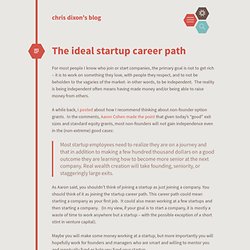
The reality is being independent often means having made money and/or being able to raise money from others. A while back, I posted about how I recommend thinking about non-founder option grants. In the comments, Aaron Cohen made the point that given today’s “good” exit sizes and standard equity grants, most non-founders will not gain independence even in the (non-extreme) good cases: Most startup employees need to realize they are on a journey and that in addition to making a few hundred thousand dollars on a good outcome they are learning how to become more senior at the next company. Real wealth creation will take founding, seniority, or staggeringly large exits. As Aaron said, you shouldn’t think of joining a startup as just joining a company. Ramen Profitable. July 2009 Now that the term "ramen profitable" has become widespread, I ought to explain precisely what the idea entails.
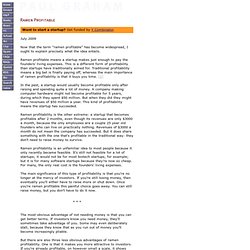
Ramen profitable means a startup makes just enough to pay the founders' living expenses. This is a different form of profitability than startups have traditionally aimed for.